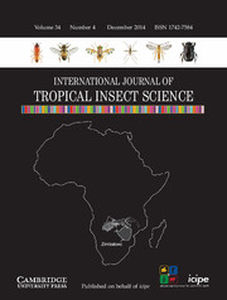Article contents
Resistance mechanism to the pod-sucking bug Clavigralla tomentosicollis (Hemiptera: Coreidae) in the cowpea IT86D-716 variety
Published online by Cambridge University Press: 21 December 2010
Abstract
Resistance mechanisms to the pod-sucking bug (PSB) Clavigralla tomentosicollis Stäl, in cowpea genotype IT86D-716, were studied in field and laboratory. Non-preference was evaluated on three cowpea varieties (IT86D-716, Moussa local and KVx396-4-5-2D) through measuring differences in population parameters and extent of damage under field and laboratory conditions. Antibiosis was evaluated based on development parameters of C. tomentosicollis when reared on pods of the aforementioned varieties. The variety IT86D-716 consistently exhibited both non-preference and antibiosis resistance mechanisms to C. tomentosicollis. A chemical analysis of the pods was conducted to identify compounds conferring antibiosis. Several compounds including cyanogenic heterosides, flavonoids, tannins and trypsin inhibitors were present in pods of IT86D-716. Evidence suggests that antibiosis due to these compounds may contribute to the resistance to PSB. In the case of antibiosis, 5-day long exposures were adequate to observe nymphal mortality. Based on this finding, a fast, reliable and low-cost screening of pods can be carried out in the laboratory for identification of lines that are C. tomentosicollis resistant.
- Type
- Research Paper
- Information
- International Journal of Tropical Insect Science , Volume 30 , Issue 4 , December 2010 , pp. 192 - 199
- Copyright
- Copyright © ICIPE 2010
References
- 10
- Cited by


